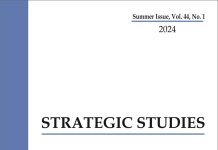Obama at War: Congress and the Imperial Presidency. Ryan C. Hendrickson. Lexington Kentuky: The University Press of Kentucky, 2015. Pp. 192.
Amna Ejaz Rafi
The coercive US approach in world politics particularly the troops deployment in other countries has impacted the global environment. Some see the US military endeavours as contributing to peace. Others view the US military overtures as part of an aggressive policy and expansionist agenda. The US pre-emptive doctrine was in response to the September 11 terrorist attacks. Since then, the US has been actively pursuing counter-terrorism operations. The use of military force has been an active component of the US-led War on Terror (WoT). Obama at War: Congress and the Imperial Presidency by Professor Ryan C. Hendrickson, discusses the US-led wars, and highlights the interplay of Congress and Presidential powers in these wars. The author’s research interests include American military action abroad and congressional-executive relations over the use of force.
As stated in Article 1, Section 8 of the US Constitution: “Congress – not the President – has the authority to declare war” (p.7). The Constitution provides the President the power to act as the country’s Commander in Chief, but this power is balanced by Congressional powers that speak directly to the use of force abroad. In line with this, the use of military force cannot be undertaken without prior approval by the Congress (p.21). In the US military interventions in Iraq, Afghanistan, Libya and Syria, the Presidential powers seemed to have overtaken the Congress’ activism. During former President Bush’s tenure, Iraq was attacked on account of possessing, allegedly, Weapons of Mass Destruction (WMDs). President Bush did consult Congress, but Congressional approval was not sought (p.11).












